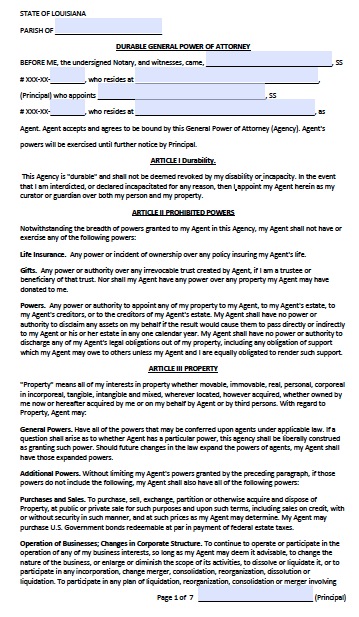Attorney Approved Version!
You can obtain either a general or a specific power of attorney. The general power gives the agent vast authority over your assets. This includes the abilities to buy and sell property on your behalf, continue in the operation of any of your business interests, such as increasing the scope of its activities or even liquidating it, to borrow and lend money, improve property, participate in litigation, and many other activities. Thus, you should not be too careful in choosing an agent because he or she would have a great deal of power over your property.
Laws – Louisiana law does not use the term “power of attorney.” Instead, it uses the terms “representation,” “procuration” and “mandate.” The distinction can get complicated, but “procuration” and “mandate” are closest. A “procuration” involves one person gives another person power to perform particular acts involving “legal relations,” but creates no duties that the other person is bound to perform. A “mandate” is closer to a contract, in which both sides agree that one person will act on another’s behalf. Because the “legal relations” of a procuration are generally not thought to include medical matters, a common subject of powers of attorney, and the Louisiana State Elder Commission refers to a health care power of attorney as a “mandate,” this entry is focused on mandates. The relevant laws may be found in the Civil Code, Title XV, Chapter Two, which includes all of Civ. Code Ann. Art. 2989 through Civ. Code Ann. Art. 3032.
Signing Requirements – As noted above, for a mandate to be effective, both the “principal” and the equivalent of the attorney-in-fact must sign the document. Louisiana law does not stipulate witness or notary requirements, but it is recommended to sign in front of at least two adult witnesses and a notary.

